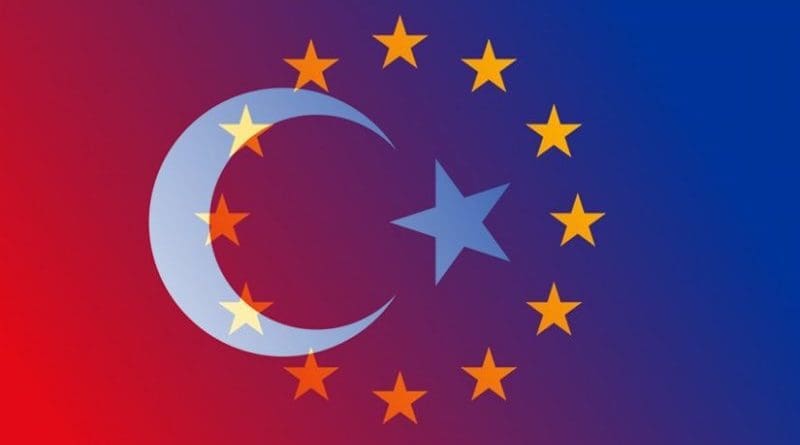EU Continues To Slam Turkey Over Mediterranean Conflict – OpEd
By Arab News
By Yasar Yakis*
The European Council this month held a special summit to discuss a number of issues. Among them was the EU’s approach to Turkey-Greece relations.
Greece and Cyprus actively lobbied before the summit to impose sanctions on Turkey. The only favor done to Ankara was to begin the “conclusions” of the summit with a less negative narrative before moving on to the more troublesome issues. The chapter on Turkey starts by affirming that the EU “has a strategic interest in a stable and secure environment in the eastern Mediterranean and the development of a cooperative and mutually beneficial relationship with Turkey.”
If the communique is less harsh to Turkey than expected, it is thanks to German Chancellor Angela Merkel’s intervention to come up with a more balanced text. The summit’s conclusions fall short of imposing sanctions, but the sword of Damocles is still hanging over Turkey’s head.
After the text registers the relatively positive aspects of Turkey’s relations with the EU, it then moves back to its established practice of giving priority to the national interests of its member states, irrespective of whether they are justified. By doing so, the EU ignores that Turkey is also an eastern Mediterranean country and has sovereign and legitimate rights in the region, as registered with the UN secretary-general.
Turkey has also signed an agreement on the eastern Mediterranean with the UN-recognized Government of National Accord of Libya and registered it with the UN secretary-general. Greece has signed a similar accord with Egypt, but the two agreements delineate overlapping maritime jurisdiction areas. International law provides that, in such circumstances, the two sides to the conflict should sit down and negotiate.
During the signing of the Greece-Egypt agreement on the demarcation of their maritime jurisdiction areas, Cairo acted more responsibly by not giving its consent for the demarcation of Greek maritime territory around Kastellorizo — a tiny Greek island close to the Turkish coast.
There are obstacles to peacefully solving the conflicts between Turkey and Greece on the question of their respective maritime jurisdiction areas. Greece, at the stage of ratification of the UN Convention on the Law of the Sea, submitted a written statement to the UN saying it does not recognize the jurisdiction of the International Court of Justice (ICJ) on: The demilitarized status of several Greek islands in the Aegean Sea and the breadth of the Greek territorial waters.
Greece made this statement in line with the provisions of Article 36, Paragraph 2 of the statute of the ICJ, so there is nothing illegal, but this is an “a la carte” application of international law. However, Turkey would not mind because the demarcation of its and Greece’s maritime jurisdiction areas is an extremely specific case.
Therefore, an equitable solution to Turkish-Greek relations can only be found through an even-handed approach and good neighborly relations. Otherwise, tensions will dominate the relations between them and Athens will feel unnecessarily threatened.
Greece has complained on several occasions that Turkey’s drilling activities in the Aegean are threatening to cause irreparable damage to its rights. The ICJ, in its decision of Sept. 11, 1976, denied Greece’s request and said there was no sufficient risk of “irreparable prejudice” to Greece’s rights. After a similar complaint by Greece, the ICJ on Dec. 19, 1978, found that “it did not possess the jurisdiction to entertain Greece’s application” on Turkey’s activities in the Aegean.
Having failed in these previous initiatives to blame Turkey with international judicial bodies, Greece this time brought the case to a body where Ankara is not represented. The EU backed Greece’s unilateral claims and disregarded Turkey’s legitimate rights.
Coming back to this month’s European summit, the conclusions shifted to a threatening tone, warning of sanctions by saying: “The European Council will continue to closely monitor developments and will revert accordingly and take decisions as appropriate at the latest in its December meeting.”
Whether Turkey was impressed or alarmed by the EU’s warnings is another issue. It certainly did not wait to sharply criticize the bloc’s unilateral approach to the conflict.
Turkey and Greece have at least decided to resume their famous “exploratory talks.” They were suspended in 2016 after their 60th round, despite the fact that almost 90 percent of the pending questions were agreed upon. Regardless of the reasons for their suspension, it is good news that they have now been resumed.
Could this be the beginning of a new era in Turkish-Greek relations? Only time will tell.
- Yasar Yakis is a former foreign minister of Turkey and founding member of the ruling AK Party. Twitter: @yakis_yasar

